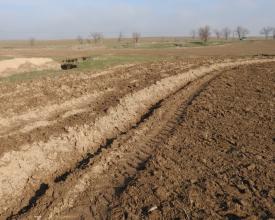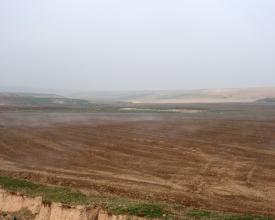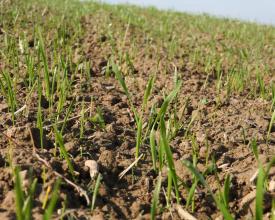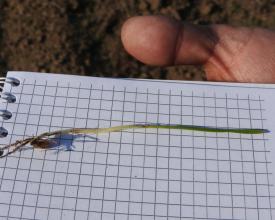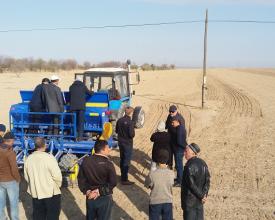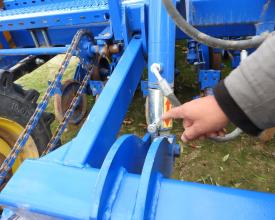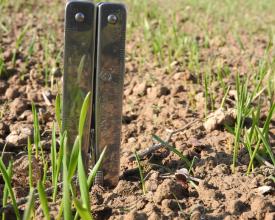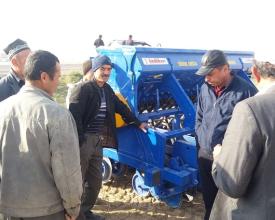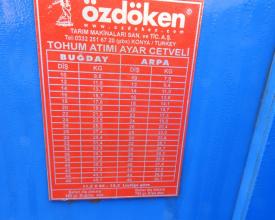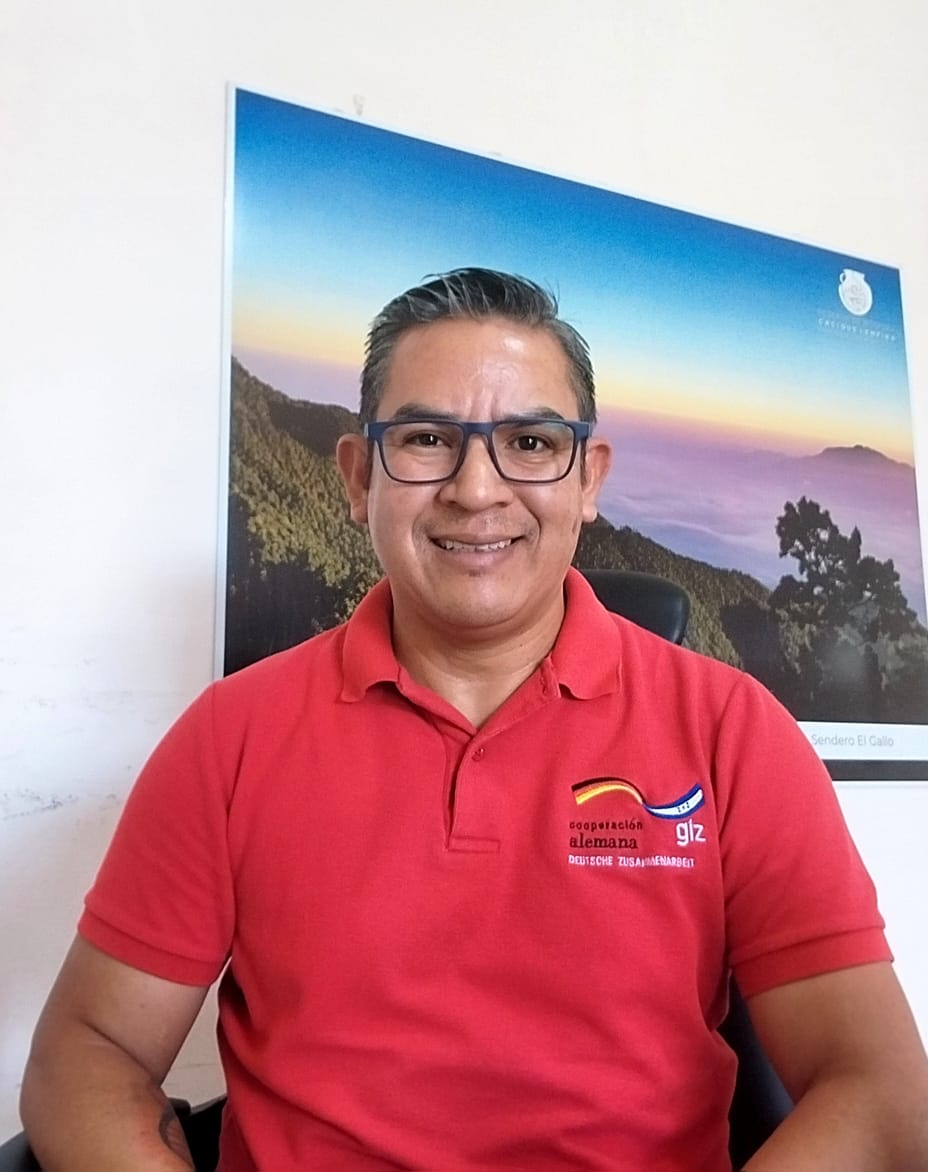
Agriculture pluviale intégrée de céréales pour l'adaptation au changement climatique
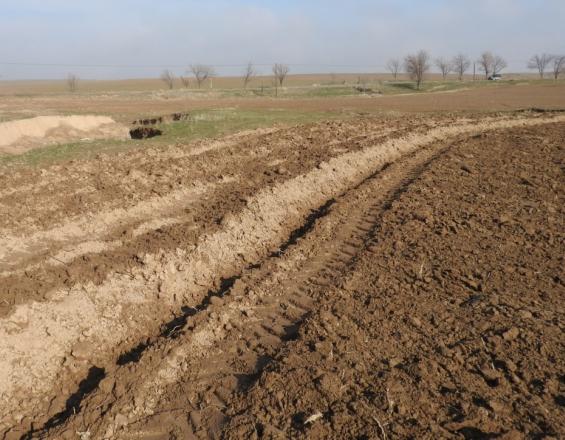
L'agriculture pluviale sous le climat semi-aride est risquée car les précipitations pendant les périodes critiques de la saison de croissance ne sont pas toujours suffisantes pour assurer le rendement escompté. Le changement climatique entraîne une augmentation de l'aridité sous la forme d'une hausse des températures et de l'évapotranspiration qui en résulte, ainsi qu'une diminution des précipitations. Les sécheresses deviennent plus fréquentes et les précipitations moins régulières, parfois sous forme de fortes averses, avec des quantités d'eau limitées qui s'infiltrent dans le sol et un ruissellement de surface qui provoque l'érosion.
L'application de la technologie du zéro labour (également appelée semis direct, semis direct ou forage direct), qui consiste à placer les semences des cultures sans traitement mécanique de la couche arable, est utilisée pour s'adapter à ces risques. En une seule opération, les résidus des cultures précédentes et les mauvaises herbes sont enlevés superficiellement, les semences sont plantées, l'engrais est appliqué et la terre est recouverte. Des herbicides sont utilisés pour lutter contre les mauvaises herbes. Une foreuse spéciale applique la quantité de semences et d'engrais appropriée.
Contexte
Défis à relever
Les variétés de cultures disponibles ne sont pas adaptées à la culture pluviale dans des conditions semi-arides. Pour y remédier, il convient de fournir des variétés de cultures adaptées aux conditions locales et produisant des rendements élevés et fiables de la meilleure qualité.
Les agriculteurs n'appliquent pas les engrais et les produits agrochimiques appropriés pour obtenir un rendement optimal. Ce problème a été résolu en fournissant des paquets de semences et de produits agrochimiques sur mesure, accompagnés d'instructions sur leur utilisation.
Les coûts d'investissement des machines pour le semis direct ont constitué un défi pour l'application de la solution. La GIZ a soutenu financièrement la coopérative "Agra va iqlim" (verbalement "Agriculture et climat") dans l'achat des machines, qui sont prêtées aux agriculteurs.
Les agriculteurs n'ont pas les moyens d'acheter les intrants nécessaires au moment de la culture, ce qui est résolu en leur fournissant des intrants agricoles sur la base d'un prêt partiel : les agriculteurs paient 50 % du coût de l'ensemble au moment de l'achat, les 50 % restants sont payés après la récolte, avec un taux d'intérêt subventionné faible.
Emplacement
Traiter
Résumé du processus
Les éléments constitutifs sont intégrés dans chaque exploitation d'une manière spécifique. Le service d'extension agricole de la coopérative "Agra va Iqlim" joue un rôle essentiel pour rassembler les éléments constitutifs et fournir à chaque agriculteur la solution adaptée à ses conditions locales et à l'impact du changement climatique en cours et prévu.
Blocs de construction
Consultation sur les pratiques agricoles et les intrants
Le service de vulgarisation agricole de la coopérative "Agra va Iqlim" fournit des conseils spécifiques à l'exploitation sur le choix des cultures et la meilleure combinaison de semences (variétés), d'engrais, de pesticides, de cultures et de techniques culturales. L'objectif de ce service est de fournir aux agriculteurs les meilleures connaissances disponibles pour guider leurs décisions et leurs pratiques.
Facteurs favorables
Le service local de vulgarisation agricole associe une longue expérience dans la région concernée à des connaissances sur les meilleures pratiques disponibles au niveau international. En outre, le service de vulgarisation collabore étroitement avec les départements agricoles des districts respectifs et jouit de la confiance des agriculteurs. La collaboration avec le projet de la GIZ a permis d'intégrer des technologies de pointe supplémentaires.
Leçon apprise
La vulgarisation agricole doit être adaptée aux conditions spécifiques des agriculteurs locaux et tous les conseils doivent tenir compte de leurs besoins et de leurs possibilités, tout en apportant de nouvelles connaissances et des suggestions directement applicables.
Emballages de semences et de produits agrochimiques
Grâce aux conseils techniques du service de vulgarisation agricole de la coopérative "Agra va Iqlim", les agriculteurs ont la possibilité d'acheter directement les paquets appropriés de semences, d'engrais, de pesticides et d'autres produits agrochimiques. Comme ces achats sont nécessaires au début de la saison de croissance, lorsque les moyens financiers sont rares, ils sont en partie fournis sous forme de prêt à des conditions abordables (taux d'intérêt inférieur aux taux normaux du marché).
Facteurs favorables
Les facteurs favorables sont les suivants :
- Les paquets de semences et de produits agrochimiques sont adaptés aux conditions de croissance locales et tous les composants sont complémentaires ;
- Les intrants sont rendus abordables au moment où ils sont nécessaires, mais les agriculteurs n'ont généralement pas les moyens de se les procurer ;
- Les prêts peuvent être remboursés lorsque les agriculteurs ont un revenu de la récolte.
Leçon apprise
La combinaison de la vulgarisation agricole, qui fournit des conseils spécifiques avec des paquets d'intrants agricoles sur mesure, et du mécanisme financier (prêt partiel à des conditions abordables) est essentielle pour l'adoption de technologies et de pratiques agricoles nouvelles et adaptées. Si un ou deux de ces éléments venaient à manquer, le taux d'adoption et d'application réussie chuterait massivement. Sans conseils techniques spécifiques, les agriculteurs n'ont pas la connaissance et la capacité d'acheter des combinaisons appropriées d'intrants complémentaires. Des conseils sans possibilité d'achat direct constituent un obstacle trop important pour les agriculteurs, qui doivent trouver eux-mêmes des fournisseurs, ce qui entraîne des coûts d'opportunité élevés, et qui achètent parfois des combinaisons sous-optimales ou une qualité et une quantité insuffisantes d'intrants. Et seule la disponibilité d'un prêt opportun et abordable permet aux agriculteurs d'acheter la quantité totale d'intrants et d'appliquer les technologies adaptées.
Utilisation de la technologie du semis direct avec des machines spéciales
La technologie du semis direct est un moyen important de réduire les coûts des intrants et d'obtenir les effets positifs de l'agriculture intégrée sur les terres non irriguées. Des machines spéciales combinent l'application de semences et d'engrais avec la fermeture de la couverture du sol et l'élimination de la biomasse excédentaire. Les machines sont adaptées aux conditions locales du sol et du micro-relief.
Facteurs favorables
Les agriculteurs individuels n'auraient pas été en mesure d'acheter ces machines spéciales par leurs propres moyens. C'est pourquoi la coopérative "Agra va Iqlim" l'a achetée avec le soutien financier de la GIZ. La machine de forage est prêtée aux agriculteurs, qui paient pour son utilisation. Les paiements collectés seront utilisés pour l'entretien et l'achat de machines de forage supplémentaires afin d'accroître la capacité d'"Agra va iqlim" à servir davantage d'agriculteurs désireux d'appliquer la solution.
Leçon apprise
Les nouvelles machines, qui ne sont pas abordables pour les agriculteurs individuels, peuvent être introduites si elles sont fournies à des coûts abordables par l'intermédiaire d'une coopérative et si leur efficacité est démontrée sur des parcelles de démonstration.
Impacts
Impacts sur l'environnement :
- réduction du compactage du sol, formation de grumeaux, destruction des particules du sol et
formation de poussière ;
- réduction de l'érosion hydrique et éolienne ;
- préservation de la matière organique et de l'habitat des organismes du sol ;
- Le fait d'éviter de briser et de retourner l'horizon supérieur du sol entrave l'évaporation de la surface du sol et augmente l'humidité du sol.
Impacts sociaux :
- réduction du risque d'érosion des ravines et de formation de coulées de boue, ainsi que des eaux de surface plus propres ;
- la réduction de l'érosion éolienne et des tempêtes de poussière qui en résultent améliore la qualité de l'air ;
Impacts économiques :
- l'économie des dépenses liées au labourage, au nivellement et au ciselage réduit considérablement les dépenses des agriculteurs pour les cultures.
impacts économiques : l'économie des dépenses liées au labourage, au nivellement et au burinage réduit considérablement les dépenses des agriculteurs pour les cultures ;
- l'amélioration de l'humidité du sol réduit les risques liés à la sécheresse dans la culture du blé d'hiver pluvial ;
- La fourniture de paquets de semences de variétés adaptées à la culture pluviale dans des conditions semi-arides, combinée à des engrais et pesticides appropriés, permet d'obtenir des rendements optimaux en grains et en paille, qui sont très demandés par les éleveurs de bétail.
Bénéficiaires
Les bénéficiaires directs sont les agriculteurs qui cultivent des céréales pluviales. Les bénéficiaires indirects sont les populations locales en général, qui bénéficient de revenus agricoles plus stables et plus élevés, de prix des céréales plus bas et d'une meilleure sécurité alimentaire.
Objectifs de développement durable
Histoire
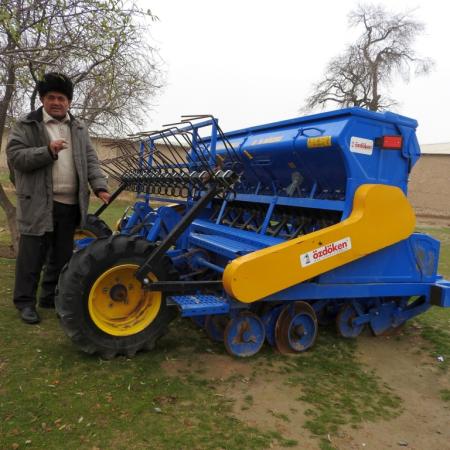
La coopérative non commerciale "Agra va Iqlim" soutient les agriculteurs dans les zones de blé pluvial de la région de Sughd. Des précipitations plus faibles et moins prévisibles et des sécheresses de plus en plus fréquentes rendent leurs activités de plus en plus risquées et, certaines années, ils parviennent à peine à recouvrer leurs coûts de culture. Mais le directeur de la coopérative "Agra va Iqlim", Fazlidin Quziboev, a également remarqué que de nombreux agriculteurs n'appliquent pas les bonnes quantités d'engrais et que les variétés cultivées ne sont pas adaptées aux conditions de l'agriculture pluviale dans un climat aussi semi-aride.
La bonne combinaison de vulgarisation agricole, de techniques culturales, de variétés de cultures, de paquets de semences et de produits agrochimiques, ainsi qu'un mécanisme de financement favorable, sont nécessaires. Avec le soutien technique et financier de la GIZ, cette solution a été développée et Fazlidin Quziboev de "Agra va Iqlim" a convaincu deux agriculteurs d'établir des parcelles de démonstration de 2,5 ha chacune en 2017.
Au vu des résultats obtenus sur les parcelles de démonstration au cours de la saison 2017/2018, 50 agriculteurs ont déjà appliqué la solution sur 50 ha de terres non irriguées pour le blé d'hiver. La sécheresse qui a sévi cette année-là a entraîné des pertes totales pour toutes les exploitations où le blé était cultivé de manière traditionnelle, tandis que les agriculteurs participants ont au moins récupéré leurs coûts. En 2018/2019, 150 ha sont déjà cultivés selon la nouvelle méthode.
Le directeur de la coopérative "Agra va Iqlim" souhaite maintenant augmenter la capacité de l'organisation et les opportunités pour les agriculteurs en achetant une foreuse supplémentaire.
